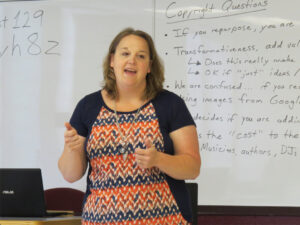This is the second in a series of posts by Angie Reid. You can read her first post here.

William Shakespeare famously penned, “All the world’s a stage and all the men and women merely players” in his famous poem, “The Seven Ages of Man.” So what happens to a woman on the cusp of middle age who wants to abandon her acclaimed role as English teacher but still wishes to remain on the grand stage of academia? This was the question that was on my mind as I wholeheartedly packed up my high school classroom and exited stage left in hopes of a less stressful, simpler life.
If you were to ask William Shakespeare, or at least read the poem, you might reflect on the subsequent line, “One man in his time plays many parts.” What was to be my part now? I had just said goodbye to my high school classroom, but I was unsure what to do next. It seems that as the years go by there are many teachers who leave the profession either because of burn-out or because they seek a career change, but many of them find that there are few employment positions for education majors outside teaching.

I began to weigh my options. I still wanted to play a role in education, but I was confused as to what that would be. It was in my soul-searching and contemplation that I decided to pursue my MA in English at Central Michigan University. I had always wanted to earn my masters, but I had been unwilling to take on additional student loan debt. A graduate assistantship seemed to be a good solution. In the English Department at CMU, graduate assistants play quite a few roles in the department, including teaching English 101 and working in the writing center. In return, the university pays the GA a small stipend and waives tuition. It was a perfect fit for me, and when I got my letter of hire in early spring of my final year of teaching high school, I felt as if I’d been cast in the role of a lifetime. I would teach English 101 in the mornings on Monday, Wednesday and Friday, and I would be free in the afternoon to pursue my degree.
I have to confess that my stage fright overwhelmed me on that first day of orientation. I was pushing 40 at that time and terrified that I had started too late in my career for such a change. In addition, I was afraid that my tried and true teaching methods would be outdated in the college classroom. Thankfully, to my surprise, I wasn’t the oldest GA in my cohort. There were more than a dozen of us of varying ages and backgrounds.
And much to my relief, part of the English Department graduate assistantship curriculum is English 614 – Seminar in Teaching First-Year Composition. In English 614, with Dr. Melinda Kreth as our instructor, we met weekly to discuss and study various teaching strategies, ideologies, and methods that we would use in our classroom. We also tried out each writing assignment that we would assign to our students. It was in this class, amongst my colleagues, that I began to explore, practice. and research the art of teaching writing. My previous teaching experience made me a leader, and I found myself sharing the knowledge and wisdom I had of teaching writing, while at the same time taking on my classmates’ ideas and research.
Dr. Kreth broke down each of the four required essays which were the literacy narrative, the summary response, the rhetorical analysis, and the research essay. For each essay students are required to compose a rough draft, submit it to a peer editing group, and revise a final essay. As the instructor I had the opportunity to look at the first draft and make suggestions before the final draft was submitted. I appreciated the fact that we were teaching writing as a process, and that students learned that writing is never done, it’s just due. In addition, students took four essay tests that measured the writing skills they have learned in each essay.
I am happy to report that most of my students conducted themselves as young professionals. I worked tirelessly to meet their various needs. Some students needed help with writing a thesis statement, while others needed to learn how to use a semicolon. Still others needed help in organization and in writing a strong paragraph. So for an entire semester I used my tried and true methods, but I also tried out some new ones.
My students graciously gave me feedback, and on some level, I felt as if we were working as a team to develop and improve their writing skills together so that they could be successful in their college career. In the midst of my teaching, I learned about their goals and their dreams, and I humbly felt l played a small part in their success.
 My new role was sitting well with me, and I felt as if I were truly making a difference in the lives of students. I was reveling in the opportunity to research teaching methods and then to try them out in the classroom. It was not only useful, but also refreshing. But despite my successes and joys of teaching at the college level, there were times when my mind got the best of me, and I allowed myself to wonder how my high school students were doing without me. They were fine, of course, in the competent care of a new teacher, but I wished from time to time that I had the opportunity to try out my new found knowledge in a high school classroom.
My new role was sitting well with me, and I felt as if I were truly making a difference in the lives of students. I was reveling in the opportunity to research teaching methods and then to try them out in the classroom. It was not only useful, but also refreshing. But despite my successes and joys of teaching at the college level, there were times when my mind got the best of me, and I allowed myself to wonder how my high school students were doing without me. They were fine, of course, in the competent care of a new teacher, but I wished from time to time that I had the opportunity to try out my new found knowledge in a high school classroom.
Looking back on that year I spent as a GA, I believe it was exactly what I needed to build myself back up as a teacher and to make myself ready to re-enter the high school classroom. My experience and research helped me to remember why I had chosen this profession in the first place, and why I had once been so dedicated to such a challenging profession. My GA position was the role I needed to play in order to appreciate the role I once had on another stage.
And in May, when my role as a GA was coming to an end, did I dare contemplate a return to the high school classroom? Could I truly do it? I was chomping at the bit to try out my new methods and strategies. However, I also knew that it wouldn’t be easy. I wasn’t sure I wanted to go back, and I wasn’t even sure that I would have the opportunity. But when my previous job opened up, I found myself gathering my materials and reapplying for a job I had once held for eleven years. The re-entry was not easy, but in just a year, my teaching skills had improved tenfold, and I felt ready to reclaim my role as a high school English teacher.
 Angela Reid, a participant in the CRWP’s 2015 Summer Institute, is an English and Communications teacher at Sacred Heart Academy in Mt. Pleasant, Michigan. Prior to earning her teaching degree at Central Michigan University, she was a State award-winning journalist. Her work was printed in newspapers throughout the United States.
Angela Reid, a participant in the CRWP’s 2015 Summer Institute, is an English and Communications teacher at Sacred Heart Academy in Mt. Pleasant, Michigan. Prior to earning her teaching degree at Central Michigan University, she was a State award-winning journalist. Her work was printed in newspapers throughout the United States.

This work is licensed under a Creative Commons Attribution-NonCommercial-ShareAlike 4.0 International License.

Leave a Reply
You must be logged in to post a comment.